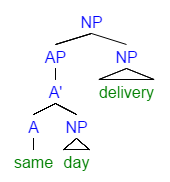I assumed it's a complement like this:
But it seems like the only adjectives that can replace 'same' are numbers.
- two-day delivery
- *good-day delivery
So what's going on here? What do you call the class of words that 'same' is part of in that sentence?
I'm not even sure if 'same' is truly "just" an A, since you can't say "*that day is same", or "*I have a same dog", almost as if it's part of the DP in some phrases
- this same dog
- the same dog
- the same green dog
- *the green same dog
- *green same dog
